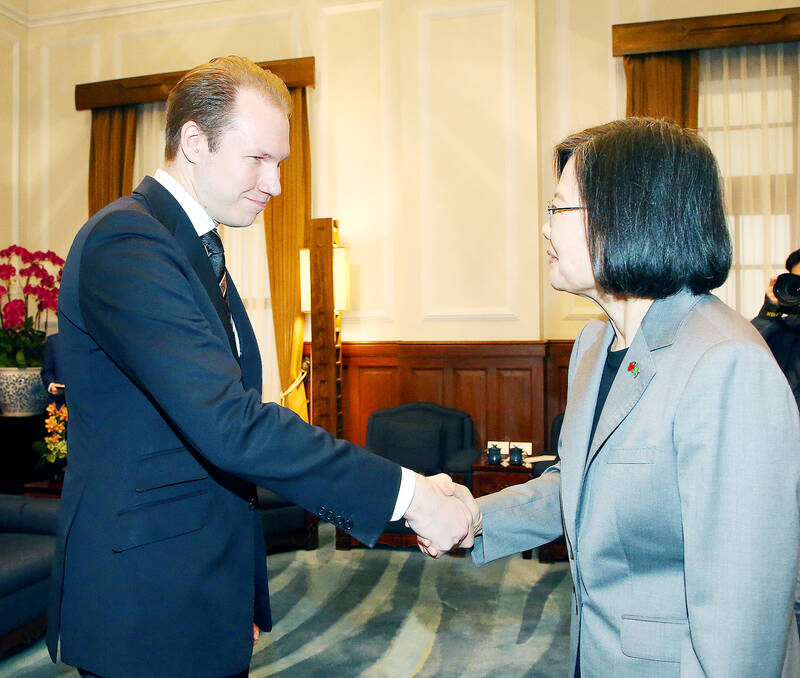Taiwan’s exclusion from the World Health Assembly (WHA) and other international organizations is “unacceptable,” visiting Swedish lawmaker Markus Wiechel said during a meeting with President Tsai Ing-wen (蔡英文) yesterday.
Wiechel is leading a delegation of Swedish lawmakers — Sara Gille, Nima Gholam Ali Pour and Rasmus Giertz — to Taiwan on a six-day visit that ends today.
While most of the free world considers Taiwan “a significant international player in trade and democracy,” the nation is excluded from many important international organizations, he said.

Photo: CNA
“This is completely unacceptable,” he added.
He and his colleagues have voiced support for Taiwan’s inclusion in the WHA, the International Criminal Police Organization and the International Civil Aviation Organization at several international occasions, and would continue to do so, Wiechel said.
He echoed visiting former British prime minister Liz Truss’ remark that Taiwan is a beacon of democracy in the Indo-Pacific region, saying: “I couldn’t agree more.”
Despite Taiwan being a relatively young democracy, it is “one of the strongest, most stable and well-functioning democracies in the world,” he said, calling it an “impressive achievement” that Taiwanese should be proud of.
It is crucial for like-minded democracies to work together, especially when totalitarian forces are growing stronger and more hostile, which is why the delegation decided to visit Taiwan, Wiechel said.
Taiwan and Sweden can benefit from deeper cooperation in fields based on the values the two sides share, including peace, freedom, democracy, universal human rights and the rule of law, he said.
The delegation learned about Taiwan’s efficient healthcare system, its impressive education system and much more during the trip, he added.
“It’s obviously not just a coincidence that Taiwan is a world-leading country in technological innovation and many other fields,” Wiechel said.
“We must increase our bilateral cooperation,” as what the delegation had learned during the past few days made him more certain that Sweden has a lot to learn about Taiwan, he said.
Tsai thanked Sweden for its support for Taiwan, including passing a resolution to support closer ties with the nation in April last year, when a delegation of Swedish lawmakers visited Taiwan, despite Chinese opposition.
Bilateral trade between Taiwan and Sweden exceeded US$1.7 billion last year, an increase of 12 percent from the previous year, she said.
The countries have been seeking more opportunities to cooperate in fields such as climate change and supply chain security, she added.
Tsai called on the delegation to support a bilateral investment agreement between Taiwan and the EU to boost cooperation, as well as the confidence of businesses from both sides in investing in the other.
Taiwan is a force for good in international society, and is a capable and trustworthy partner that can help with pandemic prevention, disaster relief and supply chain security, she said.

INVESTIGATION: The case is the latest instance of a DPP figure being implicated in an espionage network accused of allegedly leaking information to Chinese intelligence Democratic Progressive Party (DPP) member Ho Jen-chieh (何仁傑) was detained and held incommunicado yesterday on suspicion of spying for China during his tenure as assistant to then-minister of foreign affairs Joseph Wu (吳釗燮). The Taipei District Prosecutors’ Office said Ho was implicated during its investigation into alleged spying activities by former Presidential Office consultant Wu Shang-yu (吳尚雨). Prosecutors said there is reason to believe Ho breached the National Security Act (國家安全法) by leaking classified Ministry of Foreign Affairs information to Chinese intelligence. Following interrogation, prosecutors petitioned the Taipei District Court to detain Ho, citing concerns over potential collusion or tampering of evidence. The

NEGOTIATIONS: Taiwan has good relations with Washington and the outlook for the negotiations looks promising, Minister of Economic Affairs J.W. Kuo said Taiwan’s GDP growth this year is expected to decrease by 0.43 to 1.61 percentage points due to the effects of US tariffs, National Development Council (NDC) Minister Paul Liu (劉鏡清) said at a meeting of the legislature’s Economics Committee in Taipei yesterday, citing a preliminary estimate by a private research institution. Taiwan’s economy would be significantly affected by the 32 percent “reciprocal” tariffs slapped by the US, which took effect yesterday, Liu said, adding that GDP growth could fall below 3 percent and potentially even dip below 2 percent to 1.53 percent this year. The council has commissioned another institution

TRADE: The premier pledged safeguards on ‘Made in Taiwan’ labeling, anti-dumping measures and stricter export controls to strengthen its position in trade talks Products labeled “made in Taiwan” must be genuinely made in Taiwan, Premier Cho Jung-tai (卓榮泰) said yesterday, vowing to enforce strict safeguards against “origin laundering” and initiate anti-dumping investigations to prevent China dumping its products in Taiwan. Cho made the remarks in a discussion session with representatives from industries in Kaohsiung. In response to the US government’s recent announcement of “reciprocal” tariffs on its trading partners, President William Lai (賴清德) and Cho last week began a series of consultations with industry leaders nationwide to gather feedback and address concerns. Taiwanese and US officials held a videoconference on Friday evening to discuss the

NEGOTIATIONS: The US response to the countermeasures and plans Taiwan presented has been positive, including boosting procurement and investment, the president said Taiwan is included in the first group for trade negotiations with the US, President William Lai (賴清德) said yesterday, as he seeks to shield Taiwanese exporters from a 32 percent tariff. In Washington, US Trade Representative Jamieson Greer said in an interview on Fox News on Thursday that he would speak to his Taiwanese and Israeli counterparts yesterday about tariffs after holding a long discussion with the Vietnamese earlier. US President Donald Trump on Wednesday postponed punishing levies on multiple trade partners, including Taiwan, for three months after trillions of US dollars were wiped off global markets. He has maintained a 10 percent